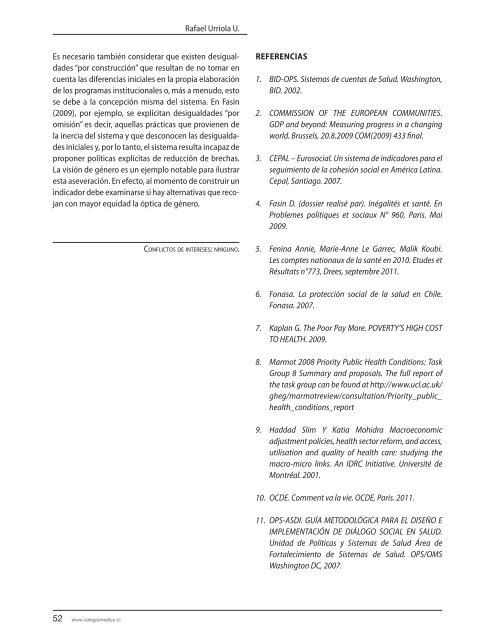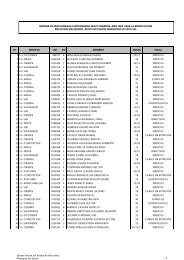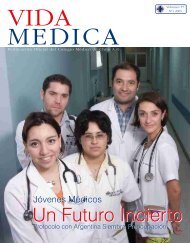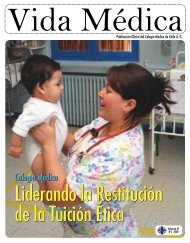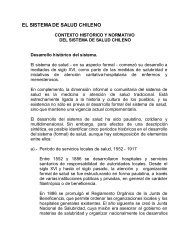CUADERNOS - Colegio Médico de Chile
CUADERNOS - Colegio Médico de Chile
CUADERNOS - Colegio Médico de Chile
Create successful ePaper yourself
Turn your PDF publications into a flip-book with our unique Google optimized e-Paper software.
52 www.colegiomedico.cl<br />
Rafael Urriola U.<br />
Es necesario también consi<strong>de</strong>rar que existen <strong>de</strong>sigualda<strong>de</strong>s<br />
“por construcción” que resultan <strong>de</strong> no tomar en<br />
cuenta las diferencias iniciales en la propia elaboración<br />
<strong>de</strong> los programas institucionales o, más a menudo, esto<br />
se <strong>de</strong>be a la concepción misma <strong>de</strong>l sistema. En Fasin<br />
(2009), por ejemplo, se explicitan <strong>de</strong>sigualda<strong>de</strong>s “por<br />
omisión” es <strong>de</strong>cir, aquellas prácticas que provienen <strong>de</strong><br />
la inercia <strong>de</strong>l sistema y que <strong>de</strong>sconocen las <strong>de</strong>sigualda<strong>de</strong>s<br />
iniciales y, por lo tanto, el sistema resulta incapaz <strong>de</strong><br />
proponer políticas explícitas <strong>de</strong> reducción <strong>de</strong> brechas.<br />
La visión <strong>de</strong> género es un ejemplo notable para ilustrar<br />
esta aseveración. En efecto, al momento <strong>de</strong> construir un<br />
indicador <strong>de</strong>be examinarse si hay alternativas que recojan<br />
con mayor equidad la óptica <strong>de</strong> género.<br />
co n F l i c t oS D e intereSeS: n i n g u n o.<br />
REFEREncIAs<br />
1. BID-OPS. Sistemas <strong>de</strong> cuentas <strong>de</strong> Salud. Washington,<br />
BID. 2002.<br />
2. COMMISSION OF THE EUROPEAN COMMUNITIES.<br />
GDP and beyond: Measuring progress in a changing<br />
world. Brussels, 20.8.2009 COM(2009) 433 final.<br />
3. CEPAL – Eurosocial. Un sistema <strong>de</strong> indicadores para el<br />
seguimiento <strong>de</strong> la cohesión social en América Latina.<br />
Cepal, Santiago. 2007.<br />
4. Fasin D. (dossier realisé par). Inégalités et santé. En<br />
Problemes politiques et sociaux N° 960, Paris. Mai<br />
2009.<br />
5. Fenina Annie, Marie-Anne Le Garrec, Malik Koubi.<br />
Les comptes nationaux <strong>de</strong> la santé en 2010. Etu<strong>de</strong>s et<br />
Résultats n°773, Drees, septembre 2011.<br />
6. Fonasa. La protección social <strong>de</strong> la salud en <strong>Chile</strong>.<br />
Fonasa. 2007.<br />
7. Kaplan G. The Poor Pay More. POVERTY’S HIGH COST<br />
TO HEALTH. 2009.<br />
8. Marmot 2008 Priority Public Health Conditions: Task<br />
Group 8 Summary and proposals. The full report of<br />
the task group can be found at http://www.ucl.ac.uk/<br />
gheg/marmotreview/consultation/Priority_public_<br />
health_conditions_report<br />
9. Haddad Slim Y Katia Mohidra Macroeconomic<br />
adjustment policies, health sector reform, and access,<br />
utilisation and quality of health care: studying the<br />
macro-micro links. An IDRC Initiative. Université <strong>de</strong><br />
Montréal. 2001.<br />
10. OCDE. Comment va la vie. OCDE, Paris. 2011.<br />
11. OPS-ASDI. GUÍA METODOLÓGICA PARA EL DISEÑO E<br />
IMPLEMENTACIÓN DE DIÁLOGO SOCIAL EN SALUD.<br />
Unidad <strong>de</strong> Políticas y Sistemas <strong>de</strong> Salud Área <strong>de</strong><br />
Fortalecimiento <strong>de</strong> Sistemas <strong>de</strong> Salud. OPS/OMS<br />
Washington DC, 2007.


